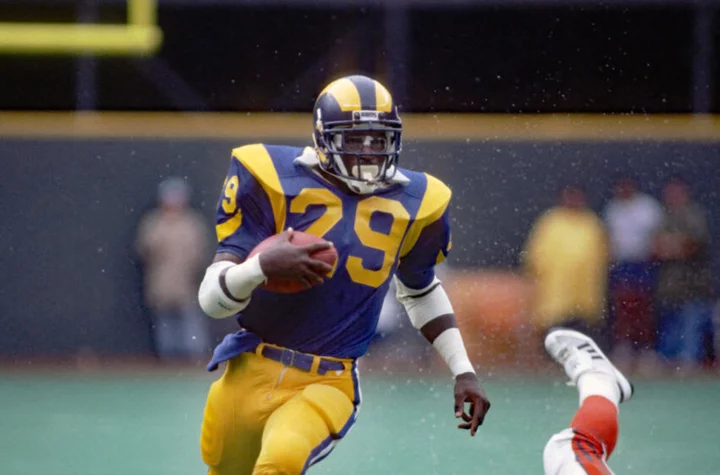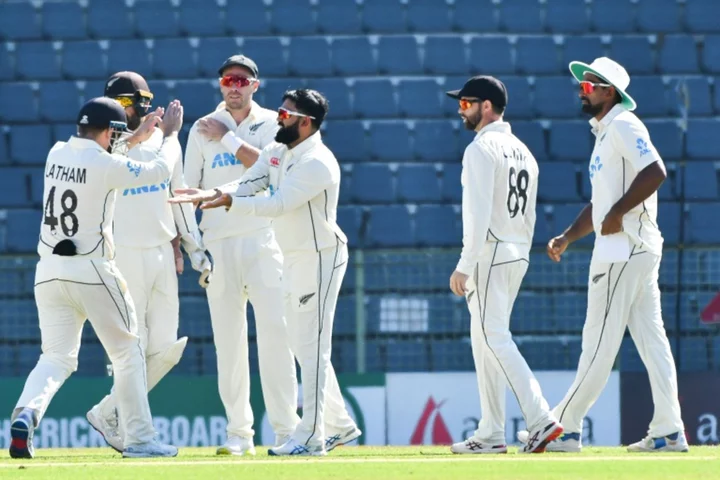These 31 outstanding players were anything but tramps during their days in the National Football League. However, baby, they were certainly born to run.
It is important that you take the title of this piece at face value. Understand that this is not a list of the greatest running back for each of the current 32 NFL franchises. It is an evaluation of the greatest rushing season via performer on each of these clubs.
We are talking about carries, yards and touchdowns and how they played a pivotal role for their clubs. Total yards from scrimmage, receptions and contributions on special teams have been discussed elsewhere.
To make it even clearer, the most rushing yards for each team in a season by a player is not exactly what we're looking for here as well. Postseason numbers will be taken into account. All in all, it's another trip down memory lane and with lots of other running backs getting their due.
Arizona Cardinals: Ottis Anderson (1979)
The franchise was still a few years away from making its move to the desert. The St. Louis Cardinals were NFC East champions in 1974 and 1975 and the team was solid for a few years afterwards. However, the club suffered through a forgettable 6-10 showing in 1978. The team wound up with the eighth overall pick in 1979 and opted for University of Miami running back Ottis Anderson.
He wasted little time making a big impression. He was the NFL Offensive Rookie of the Year and earned All-Pro honors thanks to 331 carries for 1,605 yards and eight touchdowns. More than 40 years later, that remains the Cardinals' single-season record for yards on the ground.33
Atlanta Falcons: Jamal Anderson (1998)
The franchise has had its share of quality running back over the years. Gerald Riggs, a first-round pick in 1982, remains the franchise's all-time rushing leader. Who knows what would have happened if four-time Pro Bowler William Andrews, who played in only 87 regular-season contests, had been able to stay healthy? He ran for 1,000-plus yards in four of his six seasons, including an impressive 1,567 yards in 1983.
In 1994, the Atlanta Falcons used a seventh-round selection on University of Utah running back Jamal Anderson. He was a dependable performer who blossomed in his third season, which was the first of four 1,000-yard rushing campaigns in five years.
The fifth year for the former Utes' standout proved to be the charm. In turn, it was also a big season for head coach Dan Reeves' club. The Falcons won their final nine regular-season games for a 14-2 record. Anderson finished with 410 carries, the second-most in a season in NFL annals, good for 1,846 yards and 14 touchdowns.
The 1998 Pro Bowler and All-Pro didn't slow down come the postseason as Reeves' club would reach Super Bowl XXXIII. Anderson totaled a combined 70 carries for 276 yards and a pair of rushing TDs vs. the 49ers, Vikings and Broncos.
Baltimore Ravens: Jamal Lewis (2003)
In 2019, the franchise saw quarterback Lamar Jackson (1,206) and running back Mark Ingram (1,018) both hit the 1,000-yard rushing mark in the same season. It was the seventh time and the last occurrence in NFL annals that teammates ran for 1,000-plus yards in the same season.
That season, Jackson (whose total is the most by a quarterback in a season in league annals) was not only the league's MVP but the Baltimore Ravens set a new NFL single-season record for most rushing yards by a team.
Still, it was 20 years ago that the fifth overall pick in the 2000 NFL Draft joined some rare company. His performance in '03 was made even more amazing considering that he missed all of 2001 with a knee injury.
As a rookie in 2000, Lewis was part of a Super Bowl championship team as he ran for 1,364 yards and six scores. He bounced back in '02 one year after the aforementioned injury and ran for 1,327 yards and six TDs and obviously just getting warmed up.
In 2003, he was a 16-game starter who rolled up 387 carries for 2,066 yards and 14 touchdowns. That included a 295-yard outing in Week 2 vs. the visiting Browns that set a new single-game record (until Minnesota's Adrian Peterson ran for 296 yards vs. the Chargers in 2007).
All told, Lewis' 2003 showing earned him Pro Bowl and All-Pro honors.
Buffalo Bills: O.J. Simpson (1973)
It was a different time, a different set of rules and a much different style of play.
Running backs and the ground game were the focal point of NFL offenses for quite a spell. One of the best ever was the first overall pick in the 1969 NFL Draft. He made his name at USC as a game-breaking performer. Pro Football Hall of Famer O.J. Simpson put a charge into the Buffalo Bills' attack and was aided by an offensive front that earned the name "The Electric Company."
Although numerous players have surpassed that magical number from 50 years ago, you could argue that Simpson's 2003 rushing yards in a 14-game season in 1973 remain the standard and perhaps the most-discussed single-season performance by a runner. That's pretty interesting considering that two years later, Simpson had quite the complete season with 2,243 yards from scrimmage and 23 touchdowns.
Back to '73, when he earned both NFL Offensive Player of the Year and league MVP honors. He began the season with 250 yards rushing vs. the Patriots and ended the year with 200 yards on the ground at Shea Stadium vs. the Jets.
Talk about an interesting set of numbers? Simpson averaged 6.0 yards per attempt that year on 332 carries. He also caught only six passes for 70 yards.
Carolina Panthers: DeAngelo Williams (2008)
In 2009, running backs Jonathan Stewart (1,133) and DeAngelo Williams (1,117) each ran for at least 1,000 yards in the same season. All told, it's a feat that has only happened seven times in league history. Both Williams (2006) and Stewart (2008) were first-round picks by the Panthers in a span of three years.
In 2008, Williams was in his third NFL season and was the focal point of the Carolina running game. The former University of Memphis standout put up so-so numbers in his first two years in the league, totaling a combined 265 carries for 1,218 yards and five scores in a total of 29 contests.
That all changed in '08 when he was part of a team that finished 12-4 and won the NFC South under head coach John Fox. Williams started all 16 games and finished with 273 attempts for a team-record 1,515 yards and a league-high 18 touchdowns. He also led the league with 20 total TDs.
Unfortunately for Fox and the Panthers, Williams' big year and the club's dozen victories didn't mean much come playoff time. The team hosted the Arizona Cardinals in the NFC Divisional Playoffs and the productive running back was kept in check. He finished with just 63 yards on 12 carries in a 33-13 loss.
Chicago Bears: Walter Payton (1977)
It was the final 14-game season in the NFL and also the final year before the league made dramatic rule changes to make the passing game more prevalent. Hence, it was only fitting that one of the greatest players in NFL annals had a huge year and led his club to its first postseason appearance since 1963.
Chicago Bears running back Walter Payton had a somewhat quiet rookie season. The fourth overall pick in the 1975 NFL Draft ran for only 679 yards and seven scores. He did catch 33 passes and also returned 14 kickoffs that year.
The Jackson State product earned All-Pro honors a year later when he carried 311 times for 1,390 yards and 13 scores. Payton was just getting warmed up when it came to his NFL career.
In 1977, Chicago's workhorse finished the season with 339 carries for 1,852 yards and 14 touchdowns. He ran for 100-plus yards in 10-of-14 contests. That included a then-NFL record 275 yards rushing vs. the Vikings in Week 10 at Soldier Field.
That season-yardage total in 1977 currently ranks 16th in NFL annals. More importantly, Payton was not only named the league's MVP, the Bears won their final six games and clinched a playoff berth.
Cincinnati Bengals: Corey Dillon (2000)
There is only one player who appears twice on this 32-team list.
Running back Corey Dillon is somewhat underappreciated in terms of what he was able to achieve in the National Football League.
A second-round draft choice by the Cincinnati Bengals in 1997, the former University of Washington standout put up some impressive numbers in seven seasons with the club and a total of 10 years in the NFL. He ranks 20th in league annals with 11,241 yards on the ground, to go along with 82 rushing scores. He was named to three Pro Bowls during his seven-year stint with the franchise.
In his fourth season in the league, Dillon had his best year with Cincinnati. After a sluggish start in which he carried the ball 41 times for 82 yards in the team's first three games, he began to warm up despite the team's struggles. The 0-6 Bengals hosted the Denver Broncos in Week 8. Dillon totaled 22 carries for 278 yards and two scores in a 31-21 win. The yardage total was a new league record, breaking the mark of the Bears' Walter Payton (275) set in 1977 (and since broken).
Six weeks later, he totaled 35 carries for 216 yards and a score in a victory over the Cardinals. Dillon finished the season with 315 attempts for 1,435 yards and seven scores.
Cleveland Browns: Jim Brown (1963)
How to choose just one season when it comes to a legend who many still consider the best running back in NFL history and perhaps the top player in league annals?
Earlier this year, the world said goodbye to Pro Football Hall of Famer Jim Brown. His legacy is without question and many feel he is still the standard for running backs in this game, even though the ground attack has gone in a somewhat different in recent years.
Nonetheless, Brown's brief nine-year career remains impressive. He averaged 104.3 yards per game during the regular season in 118 contests. He led the league in rushing yards eight times, was a Pro Bowler in each of his nine campaigns and named All-Pro eight times.
It was his seventh season in the NFL that he might have outdone himself. The Browns finished 10-4 and actually missed out on the postseason. Brown was nothing short of magnificent. He ran 291 times for a career-high 1,863 yards and a dozen touchdowns in 14 outings. Do the math and that's a blistering 133.1 yards per game on the ground.
A mere 60 years later, that '63 showing ranks 13th in NFL annals in terms of a single-season performance.
Dallas Cowboys: Emmitt Smith (1993)
Considering how the 1993 season began for the NFL's all-time rushing leader, who would have thought he would enjoy this impressive of a campaign?
Emmitt Smith had led the NFL in rushing yards the previous two seasons. However, he was looking for a substantial raise. Eventually, the parties came to an agreement, but not before the reigning Super Bowl champion Dallas Cowboys had dug themselves a 0-2 hole without him.
He would embark on a season in which he ran for 1,486 yards and nine scores in the final 14 games. Late in the first half of a Week 18 clash with the Giants, Smith suffered a shoulder separation. He barely missed any time and finished the game with 168 yards on 32 carries. He also caught 10 passes for 61 yards and a score in the overtime win. Smith would lead the league in rushing for a third consecutive year and was named NFL MVP.
When the playoffs arrived, he got better as time wore on. He ran just 13 times for 60 yards in a 27-17 conquest of the Packers. He added 23 attempts for 88 yards and one TD (he also caught a touchdown pass) in the 38-21 win over the 49ers in the NFC title game. In Super Bowl XXVIII at Atlanta, he rushed for 132 yards and a pair of scores on 30 carries and earned game MVP honors in Dallas' 30-13 victory.
Denver Broncos: Terrell Davis (1997)
It feels like a case of splitting hairs. In 1998, running back Terrell Davis ran for 2,008 yards and 21 scores and was named the NFL's Most Valuable Player. The Denver Broncos would win their first 13 games, finish 14-2 and win a second consecutive Super Bowl. Davis rushed for 102 yards in the team's 34-19 win over the Atlanta Falcons. However, it was quarterback John Elway that earned Super Bowl XXXIII MVP honors.
One year earlier, Davis had an even bigger role in the team's 12-4 finish and first NFL title. Mike Shanahan's club took a back seat to the 13-3 Kansas City Chiefs in the AFC West in 1997. The Broncos were headed to the playoffs but would have to do it the hard way via the wild card route.
The 1995 sixth-round pick from the University of Georgia ran for 1,750 yards and 15 scores in 1997 in just 15 games. He reached the 100-yard mark 10 times.
Davis would be even busier during the team's four-game postseason journey. He totaled at least 25 carries in each game and ran for a combined 581 yards in wins over the Jaguars (184), Chiefs (101), Steelers (139) and Packers (157). That final game saw him total 30 attempts, score three touchdowns and capture Super Bowl XXXII MVP honors.
Detroit Lions: Barry Sanders (1997)
It's been far too long since the Detroit Lions have enjoyed any kind of real success. The franchise hasn't won an NFL championship since 1997 and hasn't captured a division title since 1993.
The team also hasn't won a playoff game since routing the Dallas Cowboys, 38-6, at the Pontiac Silverdome in the 1991 NFC Divisional Round. Running back Barry Sanders ran for a touchdown in that game, but quarterback Erik Kramer owned the day.
Six years later, the Lions would be playoff bound again. The head coach was Bobby Ross and Sanders would enjoy his most productive season.
It didn't appear 1997 would be anything special for the Pro Football Hall of Famer after he totaled a combined 53 yards on 25 carries in the season's first two weeks. In each of the Lions' final 14 outings, Sanders ran for at least 100 yards. In his final six games, he totaled 134 carries for 950 yards and seven scores. He finished the season with 2,053 yards and 11 touchdowns and was named the league's co-MVP along with Packers' quarterback Brett Favre.
Unfortunately for the Lions, the season would result in a playoff appearance but no victory. Sanders was limited to 65 yards rushing on 18 carries in a 20-10 loss at Tampa Bay.
Green Bay Packers: Ahman Green (2003)
The Green Bay Packers have had quite an array of talent at the quarterback position. From Pro Football Hall of Famers Arnie Herber, Bart Starr and Brett Favre to prolific Aaron Rodgers, now a member of the New York Jets.
The team has also had their share of star running backs. Jim Taylor and Paul Hornung are enshrined in Canton. John Brockington was the 1971 NFL Offensive Rookie of the Year. Dorsey Levens was a steady performer for eight seasons with the club. These days, Aaron Jones has made his mark in the league.
There was also talented Ahman Green. His career began in Seattle in 1998, but he was dealt to Green Bay via trade in 2000. He wound up playing a total of eight seasons with the team, was named to four Pro Bowls and is the franchise's all-time leading rusher with 8,322 yards.
In his fourth season with the club, Green totaled 355 carries for 1,883 yards. The latter number is tied for 10th in NFL history in terms of a single-season performance. A total of 15 of those attempts resulted in touchdowns. He rushed for 66 yards and two scores in the overtime playoff win over Seatle. Green rushed for 156 yards in the divisional round, albeit in a losing effort at Philadelphia.
Houston Texans: Arian Foster (2010)
In 2010, the Houston Texans were just in their ninth year of existence. There wasn't much to get excited about so far as the team had yet to reach the postseason. However, Gary Kubiak's club was on the verge of back-to-back AFC South titles in 2011 and 2012. The Texans were led by quarterback Matt Schaub and wide receiver Andre Johnson was one of the best players in the league at his position.
However, the catalyst on offense was a former undrafted free agent who made his presence felt in his second NFL campaign.
Former University of Tennessee running back Arian Foster played in only six games during his first season. That all changed in 2010 when he appeared in all 16 contests and made 13 starts. He totaled 327 carries for an NFL-best 1,616 yards and a league-high 16 touchdowns on the ground. He earned Pro Bowl and All-Pro honors in a season in which he finished with an NFL-high 2,220 yards from scrimmage and 18 total TDs.
When healthy, Foster was one of the better runners in the league during the 2010s. He actually ran for 1,200-plus yards in four of his seven seasons with the Texans and was named to the Pro Bowl four times.
Indianapolis Colts: Edgerrin James (2000)
There are any number of directions you could go when it comes to this franchise and its many talented running backs. In his first full season with the Colts in 1988, Pro Football Hall of Famer Eric Dickerson led the NFL with 1,659 yards on the ground.
The team made Marshall Faulk the second overall pick in 1994 and he would run for 1,000=plus yards with the club in four of his five seasons with the team. In 2021, Jonathan Taylor led the league with 1,811 rushing yards in his second NFL campaign.
In 1998, then-Colts general manager Bill Polian selected quarterback Peyton Manning with the first overall pick. The latter took his lumps and the club finished 3-13. In 199, the team decided to deal Faulk to the Rams in a deal that worked out well for both clubs. In the draft that year, Polian used the fourth overall selection on University of Miami standout Edgerrin James.
The former Hurricane blew through opposing defenses for an NFL-high 1,553 yards rushing in his first season. The Colts went from a three-win team to a 13-3 division champion in 1999. James was even busier in 2000 when he led the league in rushing yards (1,709) for a second straight season. He closed the season with three straight 100-yard performances and ran for 107 yards in the team's overtime playoff loss at Miami.
Jacksonville Jaguars: Maurice Jones-Drew (2011)
As the franchise embarks on its 29th NFL season, the Jacksonville Jaguars have had their share of talented runners. Fred Taylor remains the franchise's all-time leading rusher with 11,271 yards. He still owns the NFL record for the longest run in postseason history, going 90 yards for a score in the club's 62-7 rout of the Miami Dolphins in the 1999 AFC Divisional Playoffs.
Currently, the defending AFC South champions have a budding star in Travis Etienne. After missing his rookie campaign in 2021, he led the club with 1,125 yards on the ground in 17 games this past season.
However, there's only been one occurrence where a Jaguars' player led the league in rushing yards. That would be Maurice Jones-Drew, a second-round pick from UCLA in 2006 who took a back seat to Taylor early in his career and went on to carve his own niche.
In 2011, Jones-Drew earned Pro Bowl and All-Pro honors. He started all 16 games and led the league in carries (343) and rushing yards (1,606), albeit he ran for only six touchdowns. He had run for 1,300-plus yards in each of the previous two seasons and was a Pro Bowler each of those years.
Unfortunately, all of those yards by Jones-Drew didn't do much for his team. The Jaguars finished 5-11 and in third place in the AFC South.
Kansas City Chiefs: Larry Johnson (2006)
He was part of a big trade 20 years ago which involved the Kansas City Chiefs and Pittsburgh Steelers. When it was all said and done, the latter moved up in the first round of the 2003 draft and grabbed future Pro Football Hall of Fame safety Troy Polamalu.
Meanwhile, the Chiefs used the 27th overall pick to draft Penn State running back Larry Johnson. It was a deal that panned out better for the Black and Gold. However, the former Nittany Lion certainly had his moments in Kansas City. He enjoyed back-to-back monster seasons in 2005 and '06, both resulting in Pro Bowl invitations. However, there was a record-setting performance in 2006 that saw Johnson capture All-Pro accolades.
In 16 starts that season, Johnson ran for a career-best 1,789 yards and rushed for 17 touchdowns. He accomplished this courtesy of an NFL-record 416 carries, a mark that still stands to this day. He totaled 30-plus carries in six games and ran for 100 or more yards in 11 contests.
The Chiefs would finish 9-7 and earn a wild-card berth. They would face Indianapolis in the first round of the playoffs. The Colts finished the season with the worst rushing defense in the league, but Tony Dungy's team limited Johnson to 32 yards on 13 carries and handed Kansas City a 23-8 loss.
Las Vegas Raiders: Marcus Allen (1985)
In 2022, Las Vegas Raiders' running back Josh Jacobs totaled 1,653 yards on 340 carries (12 touchdowns) and earned Pro Bowl and All-Pro accolades. He became the first member of the Silver and Black to lead the league in rushing yards since Pro Football Hall of Famer Marcus Allen in 1985.
There was plenty to like about Allen in 1983, who had earned All-Pro honors as a rookie during the '82 strike-shortened year. In his second NFL season, the then-Los Angeles Raiders would win the AFC West with a 12-4 record and steamrolled the Steelers, Seahawks and Washington in the playoffs in capturing Super Bowl XVIII.
Allen would run for a combined 466 yards and four scores in those three contests and won Super Bowl MVP honors. It was quite a performance considering he ran for only 1,014 yards during the regular season.
Back to 1985 when Allen was a real workhorse. He totaled 380 carries (17th most in NFL history) and totaled an NFL-best 1,759 yards rushing. He ran for 100 or more yards in each of his last nine games and 11 times overall. He added 121 yards and one score on 22 carries in the divisional playoffs, but the mistake-prone Raiders fell at home to the wild-card Patriots, 27-20.
Los Angeles Chargers: LaDainian Tomlinson (2006)
As mentioned in the introduction of this piece. this lengthy saga is about the best performances by a player for each team in terms of running the football. In 2006, then-San Diego Chargers running back LaDainian Tomlinson set a new NFL mark with 31 total touchdowns. That season, he also caught 56 passes for 508 yards and three scores to go along with his rushing numbers. He finished with 2,323 total yards from scrimmage as well. His 186 points scored remains a single-season league record.
However, it is also worth noting that Tomlinson's 1,815 yards rushing (on 348 carries) that season not only led the league but it currently ranks 21st in NFL history on the all-time list. The Pro Football Hall of Fame running back also set an NFL mark with 28 rushing touchdowns. He ran for 100-plus yards in 10-of-16 contests.
That season saw Schottenehimer's talented team finished with the league's best record (14-2). The Chargers brought a 10-game winning streak into the playoffs and were the number-one seed in the AFC playoffs and hosted New England in the divisional round. Tomlinson finished the afternoon with 123 yards and two touchdowns on 23 carries. However, Marty Schottenheimer's club was upended by the Patriots, 24-21.
Los Angeles Rams: Eric Dickerson (1984)
Nearly 40 years later, it remains the NFL's single-season record for rushing yards in a season. Given the state of the pass-happy game these days, who knows if the mark will be broken anytime soon, even with the season standing at 17 games at the moment.
Future Pro Football Hall of Fame running back Eric Dickerson was just in his second NFL season and coming off quite the debut. The second overall pick in the 1983 NFL Draft led the league in carries (390) and rushing yards (1,808). The former SMU star ran for 18 touchdowns. John Robinson's team wound up grabbing a playoff berth. Dickerson was a Pro Bowler, an All-Pro and the NFL Offensive Rookie of the Year.
A year later, he would best his 1983 total by over 300 yards and broke the 11-year-old record of 2,003 yards set by Bills' running back O.J. Simpson in 1973. Dickerson ran 379 times for 2,105 yards and 14 scores. He reached the century mark on the ground a dozen times that season.
The Rams would return to the playoffs in '84, but were one-and-done. However, Dickerson did run for 107 yards and a touchdown in a 16-13 loss to the visiting Giants.
Miami Dolphins: Larry Csonka (1973)
In his first season with the Dolphins in 2002, running back Ricky Williams led the NFL in rushing with an impressive 1,853 yards. That total came via a league-high 383 carries. Williams ran for 16 touchdowns, but Dave Wannstedt's club finished 9-7 and missed the playoffs. That being said, it remains the franchise's single-season record for rushing yards in the season.
One season after achieving perfection in 1972, Don Shula's Dolphins finished 12-2. They once again won the AFC East and would embark on an impressive playoff run. That year, Larry Csonka totaled 219 carries for 1,003 yards and five scores. None of those numbers were career-bests for the future Hall of Famer. He ran for only 100 yards in three of his 14 games.
So why does he make the list in place of Williams? It was his impact in the playoffs, along with the play of a stellar offensive line and the "No Name Defense" that was the key to the Dolphins repeating as Super Bowl champions.
Csonka ran 20 times for 71 yards and one score in a 34-16 win over the Bengals in the divisional round. There were 117 yards and three touchdowns on 29 attempts in a 27-10 win over the Raiders in the AFC Championship Game. The workhorse finished with 33 carries and 145 yards and a pair of TDs and earned Super Bowl VIII MVP honors in the 24-7 victory over the Vikings.
Minnesota Vikings: Adrian Peterson (2012)
The team has had its share of phenomenal running backs such as Chuck Foreman, Bill Brown and Robert Smith. Dalvin Cook spent six seasons in the Twin Cities, running for a combined 5,993 yards and 47 scores while being named to the last four Pro Bowls.
The last time a player other than a quarterback captured league MVP honors was 2012. Vikings' running back Adrian Peterson finished the season with 2,097 yards rushing, the second-highest single-season total in league annals behind the Rams' Eric Dickerson (2.105) in 1984.
In 2012, Leslie Frazier's team won four of its first six games. However, Peterson ran for only a combined 499 yards and two touchdowns and was held below 100 yards on the ground five times. It was a much different story the rest of the regular season. A total of 235 carries added up to an impressive 1,598 yards (6.8 yards per carry) and 10 scores. The talented runner rushed for 100-plus yards in all but one of those contests. In fact, Peterson rushed for at least 150 yards in seven of those 10 outings.
In the playoff meeting with the rival Packers, Peterson carried 22 times for 99 yards. However, the undermanned Purple Gang fell at Lambeau Field, 24-10.
New England Patriots: Corey Dillon (2004)
From 1991-2004, a total of 14 seasons, the Cincinnati Bengals failed to reach the playoffs. Running back Corey Dillon was a member of the team for seven seasons (1997-2003). He owns the franchise record for career rushing yards (8,061) and was named to the Pro Bowl three times. Obviously, Dillon never appeared in a playoff game with the club.
In 2004, the Bengals dealt Dillon to the then-defending Super Bowl champion New England Patriots for a second-round draft choice. He would respond with a career campaign, as well as set a new franchise record for rushing yards for the Pats. He totaled 345 carries for an impressive 1,635 yards and a dozen touchdowns.
He played in 15 regular-season games that season and ran for 100-plus yards in nine of those contests. He missed the club's Week 8 clash with the Steelers at Pittsburgh and interesting enough, that resulted in a 34-20 loss which put an end to the Patriots' overall 21-game winning streak. However, he would get a chance to face his former AFC North rival in the conference title game.
His 73 yards on 23 carries and one score in the club's 41-27 win at Pittsburgh was part of a three-game postseason run that saw the talented performer total a combined 65 carries for 292 yards and two touchdowns in the three-game sweep of the Colts, Steelers and Eagles.
New Orleans Saints: George Rogers (1981)
The 1980 New Orleans Saints lost their first 14 games before notching a win over the Jets, 21-20, at Shea Stadium in Week 15. The "Aints" closed the season with a loss to the Patriots and earned the first overall pick in the 1981 NFL Draft.
The selection was University of South Carolina running back George Rogers, the 1980 Heisman Trophy winner. He did not disappoint in his NFL debut campaign. He was a 16-game starter who led the league in both carries (378) and rushing yards (1,674). He scored 13 touchdowns, earned Pro Bowl and All-Pro honors and was named the NFL Offensive Rookie of the Year.
All told, Rogers totaled nine 100-yard rushing performances and his 1,674 yards remains the best single-season performance in team history. The Saints, led by new head coach "Bum" Phillips, still finished in last place in the NFC West with a 4-12 record.
Rogers played in only six games during the strike-shortened season of '82 but was named to the Pro Bowl after running for 535 yards and three scores. He rebounded to run for 1,144 yards the following year. In 1985, he was dealt to Washington and was part of a Super Bowl title team in 1987. However, he never came close to matching his impressive rookie performance.
New York Giants: Joe Morris (1986)
Bill Parcells' first season as head coach of the New York Giants resulted in a 3-12-1 mark in 1983. However, the seeds were planted for a team that in his fourth year as the sideline leader would culminate with a Super Bowl XXI victory at Pasadena.
In 1986, Big Blue finished with a 14-2 record and got a big year from not only their defense but a very balanced offense. The key to the ground attack was fullback Maurice Carthon leading the way for productive runner Joe Morris. A second-round pick in 1982 from Syracuse University, he enjoyed the best season in his seven years with the organization.
Morris was a true workhorse. In 15 regular-season games, he totaled 20-plus carries 10 times and ran for at least 100 yards in eight of those outings. It adds up to 341 carries for 1,516 yards and 14 touchdowns. He was named to the Pro Bowl for the second straight year and earned All-Pro honors for the only time in his brief career.
During the Giants' Super Bowl run, he totaled at least 20 attempts in all three playoff contests. All told, there were a combined 313 yards and four touchdowns on 73 carries in double-digit victories over the San Francisco 49ers (49-3), Washington Redskins (17-0) and Denver Broncos (39-20).
New York Jets: Curtis Martin (2004)
He was a star performer with the New England Patriots and drafted by Pro Football Hall of Fame coach Bill Parcells. University of Pittsburgh running back Curtis Martin slipped to the third round in 1995 due to injury concerns. That certainly wasn't the case during his impressive 11-year NFL career with the Patriots and Jets, one that culminated with a bust in Canton, Ohio.
Martin began his career rushing for 1,000-plus yards in each of his first three seasons, the first two under Parcells. In 1997, the latter would become the head coach of the Jets.
In 1998, the Jets and Parcells decided to buy some talented groceries. He signed Martin, who was a restricted free agent, to an offer sheet. New England did not match the offer and was compensated with New York's first- and third-round picks that year.
It proved to be a worthwhile investment for the Green and White. Martin is the franchise's all-time rushing leader with 10,302 yards. In 2004, his 10th NFL season, he ran for a franchise-record 1,697 yards and a dozen touchdowns on 371 carries. At 31 years old and eight months, he also became the oldest player to lead the league in rushing yardage.
Philadelphia Eagles: LeSean McCoy (2013)
The club is headed share of excellent running backs throughout a history. From Pro Football Hall of Famer Steve Van Buren and tough Wilbert Montgomery to Ricky Watters, who spent three seasons in the City of Brotherly Love, and versatile Brian Westbrook.
In 2009, the Philadelphia Eagles used a second-round pick (53rd overall) pick on University of Pittsburgh running back LeSean McCoy. He spent his first six seasons with the franchise before being dealt to Buffalo in 2015. That was enough to become the career-rushing leader for the Eagles with 6,792 yards.
McCoy was a very-talented all-purpose back, but he also showed that he could be a real workhorse when called upon. His big year came in 2013, which also marked the debut campaign for new head coach Chip Kelly. He led the NFL in carries (314) and rushing yards (1,607), averaging 100.4 yards per game on the ground and an impressive 5.1 yards per attempt.
He finished with nine touchdowns on the ground. For the record, he also wound up leading the league in total yards from scrimmage (2,146) and earned All-Pro honors for the second time in his career.
He and the Eagles were stifled at home in the wild-card playoffs by the Saints, although McCoy finished with 77 yards rushing and one score in the 26-24 loss.
Pittsburgh Steelers: Franco Harris (1974)
From 1972-79, the Pittsburgh Steelers reached the playoffs in each of those seasons. There were four Super Bowl appearances, each resulting in victory.
Running back Franco Harris' 1974 season didn't start out well. In the first six weeks, he played in only four games and totaled 48 carries for just 206 yards and two scores. That changed on a Monday night against the visiting Falcons. The third-year pro ran 28 times for 141 yards and one touchdown in a 24-17 win. In the team's last eight regular-season contests, he racked up 160 attempts for 800 yards and three TDs.
Then came the playoffs and Harris was the workhorse. There were a combined 87 carries for 343 yards and six scores. That included earning game MVP honors in Super Bowl IX thanks to 158 yards and one touchdown on 34 attempts in the Steelers' 16-6 win over the Vikings.
It may surprise some to know that the single-season rushing yards record for the franchise does not belong to the Pro Football Hall of Fame. That would be Barry Foster, who in 1992 (Bill Cowher's debut season as head coach) ran for a robust 1,690 yards. However, Harris' impact late in 1974 and especially in the postseason was the key to the franchise's first NFL title.
San Francisco 49ers: Roger Craig (1988)
Only Pro Football Hall of Famers Emmitt Smith (18,355) and Walter Payton (16,726) have run for more yards than Frank Gore (16,000). He spent 10 of his 16 NFL seasons with the San Francisco 49ers, who made him a third-round pick in 2005. Gore is the Niners' all-time rushing leader with 11,073 yards and also owns the franchise record for yards (1,695) in a season, set in 2006.
Of course, three-time Super Bowl champion Roger Craig enjoyed some big seasons with the franchise. In his second year in the league, he became the first player to score three touchdowns in a Super Bowl (XIX). In 1985, he was the first player to total at least 1,000 yards rushing and receiving in the same season.
However, it was his 1988 performance as a runner that really stands out. He came up with career highs in attempts (310) and rushing yards (1,502), running for nine touchdowns. Yes, Craig caught 76 passes that year in 16 regular-season games. He totaled 13 receptions during the team's three-game Super Bowl XXIII title run, eight catches in the win over the Bengals.
He ran 21 times for 135 yards and two scores in the divisional round rout of the Vikings. All told, he came up with 56 carries for 274 yards and a pair of TDs in the postseason victories over Minnesota, Chicago and Cincinnati. Quite the run by quite the runner.
Seattle Seahawks: Shaun Alexander (2005)
The Seattle Seahawks first took the field in 1976. It seems as if they've always had some kind of standout running back. From Sherman Smith to Curt Warner and John L. Williams. From Chris Warren to Marshawn Lynch and Chris Carson. Now they have a promising performer in Kenneth Walker, who comes off a solid rookie season in which he totaled 1,050 yards and nine touchdowns on the ground.
In the early part of this century, the team was led by head coach Mike Holmgren. He was hired in 1999 and lasted 10 seasons in the Pacific Northwest. On his watch, the Seahawks used a first-round pick in 2000 (19th overall) on University of Alabama running back Shaun Alexander.
In 2005, the former member of the Crimson Tide led the league with 370 carries, 1,880 yards on the ground and 27 rushing touchdowns. Alexander was named the NFL MVP that season.
In the divisional playoffs vs. Washington, he was injured and limited to nine yards on six carries. Alexander bounced back a week later, rushing 34 times for 132 yards and two scores in a 34-14 win over the Panthers in the NFC Championship Game. He enjoyed a solid outing vs. the Steelers in Super Bowl XL, finishing with 95 yards on 20 carries in the 21-10 loss.
Tampa Bay Buccaneers: James Wilder (1984)
James Wilder was a second-round pick by the Tampa Bay Buccaneers in 1981. He didn't really come into his own in his fourth season. That year, he had one of the most productive campaigns in NFL history, albeit for a team that finished with a 6-10 record.
Wilder touched the ball a combined 492 times that season, good for 2,229 yards from scrimmage. He caught 85 passes that year, but none of them resulted in a score.
The focus here is what he did when it came to running the ball. Wilder totaled 20-plus carries in 13 of the club's 16 contests. He finished the year with 407 attempts, the third-highest single-season total in NFL annals. He ran for 1,544 yards and all 13 of his touchdowns came via the ground. Perhaps any other year Wilder would have earned All-Pro honors. However, the Rams' Eric Dickerson was busy setting a new NFL record with 2,105 yards on the ground. Chicago's Walter Payton finished with 1,684 yards rushing.
There was controversy in the season's final game regarding head coach John McVay. He had his defense allow the Jets to score a touchdown late in the game so Wilder could get the ball back and add to his scrimmage yardage total. The idea failed, but that takes nothing away from the running back's big year.
Tennessee Titans: Earl Campbell (1979)
Only eight times in NFL history has a player run for at least 2,000 yards in a season. Two of them have played, Chris Johnson (2,006) in 2009 and Derrick Henry (2,027) in 2020, for the franchise formerly known as the Houston Oilers. There have only been five instances where a player totaled at least 400 carries in a season and Tennessee Titans standout Eddie George (403) achieved that feat in 2000.
However, there is only one Earl Campbell. He burst onto the scene as the first overall pick in 1978. He had a huge year for an Oilers team that would capture a wild-card berth and reach the AFC title game. In his second season, the workhorse kicked off the year with 32 carries, 166 yards and two scores in a win at Washington. It was one of six games in which Campbell logged at least 30 attempts and the first of 11 contests in which he reached the century mark on the ground.
Campbell closed the regular season with seven straight 100-plus-yard rushing outings. He got banged up in the wild-card round vs. the Broncos and unfortunately, was never the same the rest of the year.
You could make a strong case that Henry's 2019 season rivals Campbell's performance in 1979, especially when you consider the former's strong finish. However, the slight edge goes to the "Tyler Rose."
Washington Commanders: John Riggins (1983)
There was the strike-shortened nine-game season of 1982 in which the Washington Redskins, now known as the Washington Commanders, won their first Super Bowl title. Running back John Riggins got hot at the right time and embarked on a four-game postseason run that ranks among the greatest performances in NFL history. He ran for 100-plus yards in each game and propelled the club to a win over the Dolphins in Super Bowl XVII.
A year later in a full season, the one-time member of the New York Jets and a member of the Pro Football Hall of Fame was obviously a lot busier. In 15 games that year, he totaled a career-high 375 carries for a personal-best 1,347 yards on the ground, to go along with an NFL-best 24 rushing touchdowns. That Washington team would set a then-NFL record for points scored (541) in a season.
Riggins ran for 119 yards and three scores in the divisional-round rout of the Rams. He rushed for 123 yards and a pair of TDs in the NFC title game victory over the 49ers. However, it did not end well for Joe Gibbs' team as they were crushed by the Silver and Black, 38-9, in Super Bowl XVIII. Riggins was limited to 64 yards on 26 carries but did score Washington's loan touchdown of the game.









